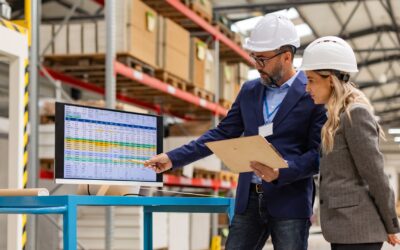Since Automation Alley became a partner in the Michigan Economic Development Corporation’s Industry 4.0 Implementation Grant program in 2021, we’ve been ramping up membership with small and medium manufacturers and extending knowledge about Industry 4.0 technology to all. As we’ve met hundreds of companies, we’ve seen a common theme running through our interactions. The vast majority of companies have stated that one of their biggest challenges is finding reliable, trained employees. Many have even put off Industry 4.0 adoption until they make progress on their human resource gap. Addressing these needs, as well as the opportunities Industry 4.0 affords manufacturers, has become a priority for the ecosystem.
For a few decades, the perception was that manufacturing was in decline in the United States. Larger companies employed a global strategy and some jobs left for more favorable environments. Success paths for young workers often included guidance away from a manufacturing career. One mantra was to tell students to work more with their minds and less with their hands. We can argue about how mindless manufacturing work was in the past, but in 2022, manufacturing is a dynamic, highly technical career path to pursue.
Automation Alley’s Industry 4.0 Knowledge Center work is devoted to helping manufacturers understand how digital technologies are changing physical manufacturing. Wherever they are on their journey, they need to broaden the skills of their workers, adopt new technology to further their mission and bring on new hires with new technical skills. They must also do this while continuing and sometimes even increasing output.
The software mentality that we cite needs to flow throughout the organization. Let systems do the counting and tracking, the inspection, the loading and other mundane tasks. Today’s employee must embrace technologies that make their jobs easier. This includes persistent skill development throughout their careers. The next generation of workers in this space are those that more freely adopt working with software systems. The gap this group must bridge has more to do with understand manufacturing and how careers are formed, than with not embracing tech.
As we’ve conducted Industry 4.0 Assessments for companies during the past few years, leadership often stated that they did not have the technical expertise needed to adopt Industry 4.0 tech in their operations. While some were right, nearly half found that they did have employees willing to lead on integrating new technology into their companies. Both this generation of manufacturing worker, and the next, are eager to bridge the perceived gap between working with your brain and working with your hands. For Michigan to succeed, they’ll need resources to do both, and the combination will develop a new generation of manufacturing leaders.
The lack of qualified workers is a major issue for manufacturers. Forecasts expect that gap to persist for years. Many employers are eager to bring jobs back the U.S. but need to make sure the workforce can grow to take on the increased workload. The smartest companies are looking to address this new opportunity by balancing new hires with technology adoption. We’ve had many of the tech companies in the Automation Alley Industry 4.0 Accelerator program help manufacturers to install an Industry 4.0 solution to help with increased output while reducing the load on the workforce. These technologies are enabling employers to meet demand while making their operations more effective, safer and secure.
To that end, there are many programs operating, and even more developing to assist with growth. Michigan supports and coordinates efforts for students, workers and employers to upskill and make the most out of their manufacturing career. Michigan Works!, the MiSTEM program and Going PRO are just a few. As the need to connect companies better with their highly skilled workers, additional programs will develop to keep Michigan at the front of manufacturing excellence both for the U.S and globally. I encourage you to join us.
John Bedz manages Automation Alley’s special programs related to entrepreneurship and has a history of working with disruptive technologies. He works with startups, capital formation groups, federal, state and regional economic development organizations and with mature companies integrating new technologies and products. His current focus is on Automation Alley's recently launched Industry 4.0 Accelerator.




